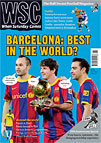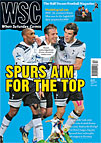 Fabio Capello has not always been in the media’s good books, and his controversial decision to strip Rio Ferdinand of the England captaincy has hardly helped to promote his media reputation
Fabio Capello has not always been in the media’s good books, and his controversial decision to strip Rio Ferdinand of the England captaincy has hardly helped to promote his media reputation
With some Premier League teams playing only two games in March, and with England’s only competitive fixture against a team ranked 116th in the world, you would think there was little for football writers to report on this month. But when there is little else to say in English football, one subject is always ripe for discussion: the terrible performance of the national team’s manager. For a man who is said to be an awful communicator, Fabio Capello’s words are taken very seriously by the football press.
Capello’s one task this month was to beat a team that conceded four goals to Switzerland in their previous competitive match. But he managed to burden himself with the additional concern of who would captain the country. In light of Rio Ferdinand’s recurring injury problems, Capello announced that John Terry would be reunited with his beloved armband. Capello being Capello, he didn’t inform Ferdinand of this decision – presumably thinking he would find out on Twitter – and he didn’t make it clear whether Terry’s promotion was to be permanent.
This ambiguity, which any smart reporter would draw out over the week to fill a series of quiet news days, was met with fits of anger in the papers. Instead of thanking Capello for donating them a minor story that could be developed into a saga, the press reacted furiously. “Fabio is out of control,” said Shaun Custis in the Sun. “His reign is verging on the ridiculous,” claimed the Mirror’s Martin Lipton. Ian Wright was “staggered” by Capello. Terry Butcher wondered if he had “lost the plot”. And a slightly suspicious Gary Lineker used his News of the World column to pose the question: “Does this fella really want to be in the job?”
Capello’s indecision not only managed to rile the pundits, he also upset some of his players. “He has alienated Rio Ferdinand, offended Steven Gerrard and sparked a flurry of text messages among the England players,” reported Lipton. The Mail on Sunday’s Rob Draper claimed that the players were “rapidly losing their last vestiges of respect for the manager” and that Capello would face their fury before the Wales game. As it turned out, when asked by Capello if they objected to Terry’s reappointment, the players stood in apathetic silence.
While the deposed Rio Ferdinand was said to be bewildered, devastated, appalled, wounded, angry, disappointed and infuriated, Terry settled back into the job in typical fashion – by contesting that he should never have lost it in the first place. There is little left to be said about Terry, but Oliver Kay summed him up well in the Times: “A psychoanalyst would have a field day with John Terry.”
Among the great wailing and gnashing of teeth, the actual importance of the captaincy was lost on most writers. Thankfully the Daily Telegraph’s Matthew Norman added a sense of perspective: “There is no more irrelevant honorific position in national life, including Silver Stick-in-Waiting.” Norman also pointed out that, aside from receiving immunity from red cards in the Premier League, no one quite knows what an England captain does. But we shouldn’t let a small matter like detail get in the way of what the Sun called “the astonishing England captaincy fiasco”. It was distressing for everyone involved, but at least it filled a few back pages.
From WSC 291 May 2011
 After José Mourinho and his Real Madrid side received hefty criticism upon their Champions League elimination at the hands of Barcelona, just how special is “The Special one?”
After José Mourinho and his Real Madrid side received hefty criticism upon their Champions League elimination at the hands of Barcelona, just how special is “The Special one?”
